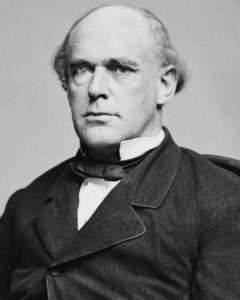The Volokh Conspiracy
Mostly law professors | Sometimes contrarian | Often libertarian | Always independent
Today in Supreme Court History: May 7, 1873
5/7/1873: Chief Justice Salmon P. Chase died. One month earlier, he dissented in the Slaughter-House Cases, and was the lone dissenter in Bradwell v. Illinois.

Editor's Note: We invite comments and request that they be civil and on-topic. We do not moderate or assume any responsibility for comments, which are owned by the readers who post them. Comments do not represent the views of Reason.com or Reason Foundation. We reserve the right to delete any comment for any reason at any time. Comments may only be edited within 5 minutes of posting. Report abuses.
Please to post comments


Kelly v. United States, 590 U.S. --- (decided May 7, 2020): the famous "blocked lanes on the GW Bridge" case which did such political damage to Chris Christie. Here, the Court threw out the wire fraud convictions of the officials who ordered the blocking because causing four days of traffic jams was not "obtaining money or property" from the Port Authority such as the statute requires.
United States v. Sineneng-Smith, 590 U.S. --- (decided May 7, 2020: the Ninth Circuit had decided sua sponte to bring in amici to brief whether the statute criminalizing the encouragement of illegal immigration was Constitutional, an issue brought up by neither party. The Court held that this was improper and remanded to the Ninth Circuit to decide on the issues actually brought up by the parties.
General Box Co. v. United States, 351 U.S. 159 (decided May 7, 1956): once a State donates its land to the federal government, the feds don't have to obey State procedures on notice when it appropriates timber already grown there by a private party.
Screws v. United States (aptly named), 327 U.S. 91 (decided May 7, 1945): defendant sheriff had beaten a black man to death. Conviction under Ku Klux Klan Act vacated because no intent to deprive victim of his civil rights. (!) Opinion written by William O. Douglas. (!!)
That was shocking to me, so I checked it. First, you have the cite wrong; it's 325 US 91, not 327. Second, that was not why it was vacated. It was vacated because the jury instruction didn't require the jury to find an intent to deprive the victim of his civil rights.
Douglas's opinion goes through a long analysis of the term "willful" which makes it clear (at least to me) that such an instruction, if given, would almost never result in a conviction. Not unless the Sheriff is on record saying "F**k the 14th Amendment! I'm killing you because you're black!!"
Blanchi v. Morales, 262 U.S. 170 (decided May 7, 1923): Puerto Rico ("Porto Rico") statute allowing summary foreclosures was Constitutional. Very short opinion; the Court held that it was such a clear and simple question of law that it did not require briefs; it decided on the existing record.
Bradwell v. Illinois. A good reminder that back then, in what so many of the 'libertarians' here think of as the more free times, half of the nation was systemically denied basic freedoms on a massive scale. The good ol' days (well, they're all dudes and it didn't effect them, so it weighs so light on their scales!).
It wasn't as if the United States was some outlier in denying women the vote in 1873. In fact, at that time there were precisely zero countries in the world that granted universal suffrage to women.
The Wyoming Territory Constitution of 1869 was the first in this country to grant universal suffrage to women. It has been suggested that one primary motive for this was to attract women to the territory, where men outnumbered women six-to-one. Prior to that, some limited voting rights for women existed in some states, generally related to types of elections (like school boards) or amount of property or wealth possessed (sometimes limited to widows).
Correction:
According to Wikipedia, there was one country that had universal women's suffrage then: the Grand Duchy of Tuscany, which gave the women vote in 1848 and then ceased to exist in 1860, though those two events are probably unconnected.
The Kingdom of Hawaii had given women the vote in 1840, but took it away in 1852.
Retraction of correction: so, in 1873, in fact, no country had universal women's suffrage.
Your warped idea is what libertarians believe undergirds your really ignorant comment. Libertarians do not pine for the good old days of government stood in the way of full participation in political, economic and social life. The fact that women and others are blocked from these things is thanks to the government.
Libertarians are nostalgic for the glorious year of 1873, when the Slaughterhouse Cases were decided.